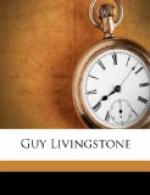I lingered in the smoking-room about midnight for a moment after Forrester left us.
“So your cousin is really engaged?” I asked Guy.
“Tout ce qu’il y a du plus fiance,” was the answer. “It was one of the last affairs of state that my poor aunt concluded before she died. Bruce is a very good match. I don’t think Bella worships him, though I have scarcely ever seen them together, and I am sure he is not a favorite with Uncle Henry; but nothing on earth would make him break it off; indeed, I know no one who would propose such a thing to him—not his daughter, certainly. There’s no such hopeless obstacle as the passive resistance of a thoroughly lazy man. Good-night, Frank. I’ve sent the Baron on for you to-morrow. We must start about nine, mind, for we’ve fifteen miles to go to cover.”
I went to bed, and dreamed that Raymond was playing ecarte with Forrester for his daughter, who stood by blushing beautifully—and never held a trump!
CHAPTER VII.
“She has two eyes so soft
and brown;
Take care!
She gives a side glance, and looks down;
Beware! beware!
Trust her not; she is fooling thee.”
So the days went on. The stream of visitors usual in a country house during the hunting season flowed in and out of Kerton Manor without any remarkable specimen showing itself above the surface. One individual, perhaps, I ought to except, the curate of the parish, who was a very constant visitor.
His appearance was not fascinating: he had a long, narrow head, thatched with straight, scanty hair; little, protruding eyes, and a complexion of a bright unvarying red—in fact, he was very like a prawn.
It was soon evident that the Rev. Samuel Foster was helplessly smitten by Miss Raymond, or, as Forrester elegantly expressed it, “hard hit in the wings, and crippled for flying!” Helplessly, I say, but not hopelessly; for that wicked little creature, acting perhaps under private orders, gave him all sorts of treacherous encouragement. I never saw any human being evolve so much caloric under excitement as he did, except one young woman whom I met ages ago—(a most estimable person; her Sunday-school was a model)—whose only way of evincing any emotion, either of anger, fear, pain, or pleasure, was—a profuse perspiration. Mr. Foster not only got awfully hot, but electrical into the bargain. His thin hairs used to stand out distinctly and in relief from his head and face, just like a person on the glass tripod. Charley suggested insulating him unawares, and getting a flash out of his knuckles, if not out of his brain. In truth, it was piteous to see the struggle between passion and nervousness that raged perpetually within him. He would stand for some time casting lamb’s-eyes at the object of his affections—to the amorous audacity of the full-grown sheep he never soared—then suddenly, without the slightest provocation, he would




